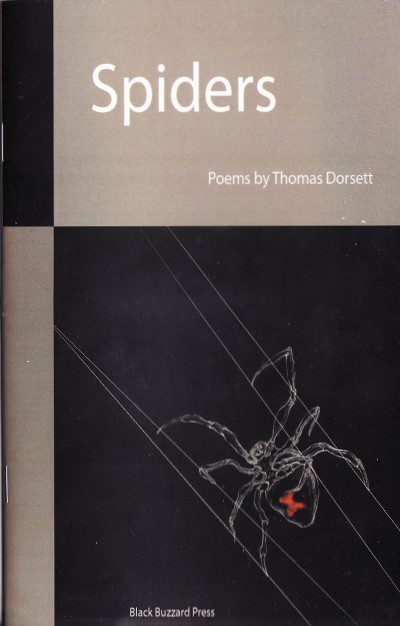Summer 2011
Table of Contents - Vol. VII, No. 2
Poetry Fiction NonFiction Reviews
Dan Cuddy
Spiders: Poems By Thomas Dorsett, Black Buzzard Press, Black Buzzard Chapbook Series Vol. xx, 2009. ISBN 0-938872-41-9, 32 pages $7.95 U.S.
Spiders by Thomas Dorsett is unlike any book of poetry that I
have read. There is a unity of vision and expression that chapbooks often
lack, but perhaps it is the uniqueness of the vision that is the reason for
this. Rilke had his angels. Dorsett has his spiders. The spiders are both a
symbol for humanity’s predicaments in the universe and, just as importantly,
the six-legged creatures themselves. The beauty of the book is how a
creature to which we have an aversion is seen as magnificent in itself and
in the religious and existential meanings gotten from its life experiences,
alien in ways from the human but so like the phenomenology of human
experience. Dorsett gives his spiders, his flies, ants, moths a personality,
a consciousness, and it is in the service of providing a mirror to our own
existence.
There is a whimsical and an ironical humor. As an example,
look at “Bad Friday.”
The world’s a venus flytrap, dear,
And
you’re nothing more than a gnat.
This cannot be everything.
The bug, apparently, has big ideas.
The pit waits beneath the bloom
In which you will be dissolved.
Resurrection; redemption
For annoying
buzzing;
God’s cupped hands---Nature’s palm
Filled with
indifferent chemicals;
A thimbleful of Lethe---Love?
The gnat decided
to find out.
Soon nothing’s left. The other side?
Don’t ask me to
write his gospel—
I’m just your average recluse spider;
My
business is flies.
The poems exhibit a very observant eye, a wit, a
philosophic turn of mind balanced with a web of very real human emotions.
The erudite learning of the poet is used in the fabrication of the poems,
but this isn’t heavy Heidegger. Many of the poems seem Buddhist in
sensibility. In the poem “What’s a bug to do”, Buddha is addressed directly
Buddha, in a land of flies
What’s a bug to do?
Another
poem’s title is “Hillel In A Previous Life.” Hillel in history is a
Jewish religious seer, and these words are ascribed to him:
"As
Hillel the Elder had stated, whosoever destroys a soul, it is considered as
if he destroyed an entire world. And whosoever that saves a life, it is
considered as if he saved an entire world." (Taken from the Wikipedia
article on Hillel the Elder)
This is Thomas Dorset’s poem:
A
spider in a shoe box in a closet
Standing on all of my legs
On a
leather instep waiting
On the left side of a shoe
My neighbor in
darkness, an ant
Lifts his antennae as if in prayer
Like a male
black widow
He ignores fangs
My six eyes are watching
What
does he want?
Who feeds if we don’t feed ourselves?
No question
his question I strike
No answer my answer
I follow
A program no one I know writes
The poetry in this small
book makes you think. The poems don’t give dogmatic answers but weave a web
of questions. However, with all the religious and philosophical overtones,
it is important not to forget the interesting world of spiders and mites and
gnats that the scientist that this poet is presents. Thomas Dorsett is a
pediatrician. He has an eye for the small things of nature, and the large,
that the average educated person overlooks. After reading this poetry I
doubt that any sensitive person will look at a spider in the same way again.
I doubt if I do the book justice. The poems used above as illustrations
give a true glimpse at the complexity which is presented in a very readable
and fluent style.
© Dan Cuddy

